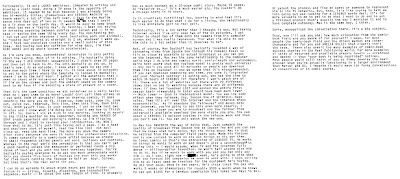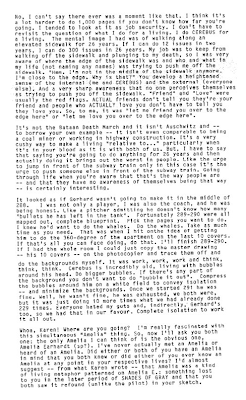
Well, this is totally fascinating to me. In your free time (ha ha) check out the book "Rebel Without a Crew" by Robert Rodriguez. He essentially worked the same way you describe here, virtually editing with the camera. This technique allowed him to create his first feature film, EL MARIACHI, for just $7,000. Oddly, I create a comic more like people put together a TV show, "shooting" out of sequence, going back for "pick ups" etc. I used to feel bad about it until I read that's how Jaime Hernandez does it, so now I just think I'm a genius.
Not really.
How much alienation do I feel from the comic book field? Almost total, I guess, but I've always felt that way. When Amelia started, we got excellent reviews, but low sales, when I started getting nominated for Eisner and Harvey awards, that made a slight difference, but not much. The real ace in the hole for Amelia turned out to be librarians. Around 2005, I contracted Harold Buchholz to work for me on a freelance basis. This was another counter intuitive move, because at the time I was paying Harold, I still had to keep a full time job myself, but Harold is an amazing person, and understands the comic book business inside and out. He actually IS a genius, in my view. So he started analyzing where the sales of our trade paperbacks were coming from, and libraries were a huge, huge percentage. He then devised a way of figuring out library check out rates across the US. This technique was super time consuming, but worth it because we found out that AR was the 4th most checked out graphic novel among kids. The other results were shocking as well. You had to go all the way to number 13 before you found a superhero book. So, we started hitting library shows and book shows just as much as scomic book conventions, and this paid off almost immediately.
But comic shops were still comic shops. The ones that invested in Amelia tended to see a nice return, and the rest pretended it didn't exist. Which is what I see as the biggest problem the direct market has had and probably always will have. If something does not conform to their own already established view of the market, it gets ignored. It's not that those stores think of me as Jimmy Gownley the small presser, it's that they don't think of me at all.
Since Amelia has always survived as a series of small successes across a bunch of different venues, it doesn't really bother me. Those "funny conversations" happen a lot though. I have been lectured about the biz many, many times by people who have had like three issues out, and sold a few hundred copies. One guy I remember seeing at two Baltimore shows in a row, and he was just bubbling over with his success. He said he really admired my ability to "struggle along". He was even going to plug Amelia Rules! in his upcoming free comic book day book (which WAS very nice of him). As for him, his success was happening "Almost too fast." His new trade paperback was also just about "to drop" and he gave me a free copy. The next year, Karen and I are at the same show, just browsing the aisles, and I come across a two dollar trade paperback box. There are about 15 copies of this guy's trade. I pulled one out and showed it to Karen. "I guess it happened too fast," she said.
I remember being lectured by a VERY big name about how this idea of publishing a kids' comic was just suicidal in today's market, and that he just KNOWS I'm spending all my parents money on this (I was like 34 at the time!). All the while, I had a check from a book fair sale in my back pocket that was going to pay Harold's salary for the next TWO YEARS. But I just stood there and listened, because what are you going to do, you know?
Even when I was just a fan, I never felt a part of the comics world. As a kid, I lived nowhere near a comic shop. My dad would drive me 70 miles to one maybe twice a year, and that was it. I never contributed to fanzines or anything. My friends were never interested in comics. Shades of Gray was about as far away from a fanboy type comic as you could get, so this kind of isolation is nothing new.
Plus, I actually kinda like it. I love that I can have an eight book deal with one of the largest publishing houses on the planet, and still feel that it's me versus the world.
Now I'll ask YOU one. Michael (Strange Attractors) Cohen and I were talking about Glamourpuss lately (which we both LOVE), and your experiments with non fiction comics. As more and more narrative elements creep in to Glamourpuss (like the Alex Raymond/Stan Drake story) do you find yourself being enticed by the idea of writing fiction again?
Not really.
How much alienation do I feel from the comic book field? Almost total, I guess, but I've always felt that way. When Amelia started, we got excellent reviews, but low sales, when I started getting nominated for Eisner and Harvey awards, that made a slight difference, but not much. The real ace in the hole for Amelia turned out to be librarians. Around 2005, I contracted Harold Buchholz to work for me on a freelance basis. This was another counter intuitive move, because at the time I was paying Harold, I still had to keep a full time job myself, but Harold is an amazing person, and understands the comic book business inside and out. He actually IS a genius, in my view. So he started analyzing where the sales of our trade paperbacks were coming from, and libraries were a huge, huge percentage. He then devised a way of figuring out library check out rates across the US. This technique was super time consuming, but worth it because we found out that AR was the 4th most checked out graphic novel among kids. The other results were shocking as well. You had to go all the way to number 13 before you found a superhero book. So, we started hitting library shows and book shows just as much as scomic book conventions, and this paid off almost immediately.
But comic shops were still comic shops. The ones that invested in Amelia tended to see a nice return, and the rest pretended it didn't exist. Which is what I see as the biggest problem the direct market has had and probably always will have. If something does not conform to their own already established view of the market, it gets ignored. It's not that those stores think of me as Jimmy Gownley the small presser, it's that they don't think of me at all.
Since Amelia has always survived as a series of small successes across a bunch of different venues, it doesn't really bother me. Those "funny conversations" happen a lot though. I have been lectured about the biz many, many times by people who have had like three issues out, and sold a few hundred copies. One guy I remember seeing at two Baltimore shows in a row, and he was just bubbling over with his success. He said he really admired my ability to "struggle along". He was even going to plug Amelia Rules! in his upcoming free comic book day book (which WAS very nice of him). As for him, his success was happening "Almost too fast." His new trade paperback was also just about "to drop" and he gave me a free copy. The next year, Karen and I are at the same show, just browsing the aisles, and I come across a two dollar trade paperback box. There are about 15 copies of this guy's trade. I pulled one out and showed it to Karen. "I guess it happened too fast," she said.
I remember being lectured by a VERY big name about how this idea of publishing a kids' comic was just suicidal in today's market, and that he just KNOWS I'm spending all my parents money on this (I was like 34 at the time!). All the while, I had a check from a book fair sale in my back pocket that was going to pay Harold's salary for the next TWO YEARS. But I just stood there and listened, because what are you going to do, you know?
Even when I was just a fan, I never felt a part of the comics world. As a kid, I lived nowhere near a comic shop. My dad would drive me 70 miles to one maybe twice a year, and that was it. I never contributed to fanzines or anything. My friends were never interested in comics. Shades of Gray was about as far away from a fanboy type comic as you could get, so this kind of isolation is nothing new.
Plus, I actually kinda like it. I love that I can have an eight book deal with one of the largest publishing houses on the planet, and still feel that it's me versus the world.
Now I'll ask YOU one. Michael (Strange Attractors) Cohen and I were talking about Glamourpuss lately (which we both LOVE), and your experiments with non fiction comics. As more and more narrative elements creep in to Glamourpuss (like the Alex Raymond/Stan Drake story) do you find yourself being enticed by the idea of writing fiction again?
about an hour ago




